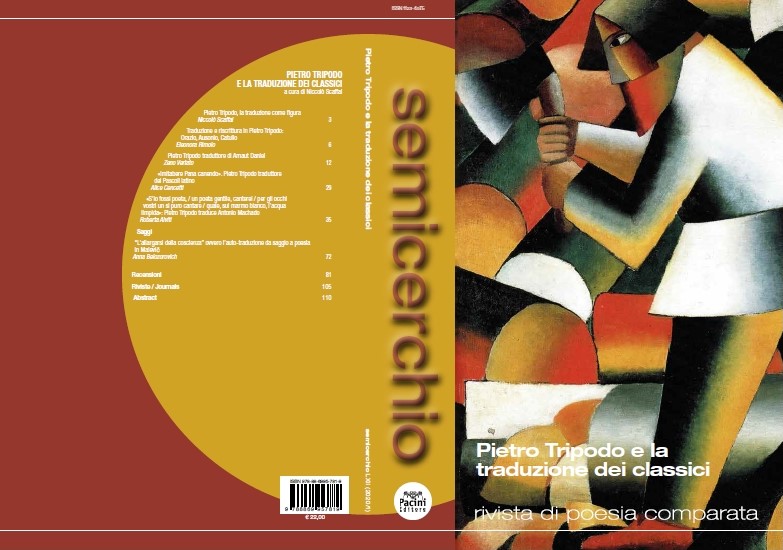
|
numero (2020) 62 (2020/1) Tradurre i classici: l'opera di Pietro Tripodo |
 |
PIETRO TRIPODO
E LA TRADUZIONE DEI CLASSICI
Niccol? Scaffai 3
Eleonora Rimolo 6
Zeno Verlato 12
Alice Cencetti 29
Roberta Alviti 35
Saggi
Anna Belozorovich
Recensioni 81 Riviste / Journals 105
Abstract ROBERTA ALVITI
"S'io fossi poeta, / un poeta gentile, canterei /
per gli occhi vostri un s? puro cantare / quale,
sul marmo bianco, l'acqua limpida: Pietro
Tripodo traduce Antonio Machado
Universit? degli Studi di Cassino e del Lazio Meridionale
r.alviti@unicas.it
The essay focuses on Pietro Tripodo's translation of
sixteen poems by Antonio Machado, one of the most
important names of twentieth-century Spanish poetry.
The aim of the essay is to analyse the translation
strategies that Tripodo employed to set up his Italian
version. As a matter of fact, Tripodo's rifacimenti are
the result of a careful work of philological excavation,
interpretation and appropriation of Machado's poems,
according to his intention to reproduce at least the
rhythmic pattern of the original text, with its various
line measures and its arrangement of stanzas.
ANNA BELOZOROVICH
L'allargarsi della coscienza
Sapienza Universit? di Roma, DSEAI
anna.belozorovich@uniroma1.it
The article analyzes the writings of Kazimir Malevich
and the self-translation processes found between texts
of a philosophical nature and his poetry. The analysis is
based on three texts written between 1916 and 1918,
the first being a note followed by two poems. All three
texts deal with themes that are peculiar of Malevich's
philosophical reflection, such as the widening of consciousness
and detachment from the earth. The significant
analogies that emerge between the texts allow to
observe mainly two phenomena: on the one hand, the
content exposed in the note migrates into the poem
reacting to its formal structure. Versification therefore
generates a distribution of contents that has its own
expressive power. Secondly, the transfer of reflection
from essay to poem allows the content itself to undergo
changes and to evolve. The analysis suggests
that the poetic form may represent a fertile space for
the development of Malevich's philosophical thought.
?
ALICE CENCETTI
"Imitabere Pana canendo". Pietro Tripodo traduttore
del Pascoli latino
Universit? degli Studi di Firenze
cencettialice@libero.it
This essay analyses the relationship between Pietro
Tripodo and Giovanni Pascoli's Latin poetry. Particular
attention was paid to his unpublished translation
of Pascoli's "Catullocalvos". Its main peculiarities (love
and a deep interest in language) arise here also from a
comparison with the remakes of the Latin Epigrams by
the poet from Romagna in Tripodo's "Other visions".
ELEONORA RIMOLO
Traduzione e riscrittura in Pietro Tripodo: Orazio,
Ausonio, Catullo
Universit? degli Studi di Salerno
eleonorarimolo@gmail.com
The essay analyses some remakes of classical texts
by Pietro Tripodo. The style is high and the poet chooses
words that are very sought after and not commonly
used, mostly of Latin ancestry: everything, however,
is linked to a process of remaking. In addition to the
rewriting of Horace's Carme I, XI in Altre visioni, four
unpublished texts by Tripod, belonging to an unpublished
collection entitled Flora, which is kept by Ignazio
Visco, a friend of the poet, are going to be analysed:
Horace's Carme I, IX ad Thaliarcum, the epigram XVIII
ad uxorem by Ausonio and Catullus carmina XCVI ET
LXXII. The encounter between the language of Tripod
and the classical language is a real collision of crossreferences
and references that stratify creating a third
language, alienating but involving; it manages to bring
the reader from the starting text to the one of arrival
preserving the classical atmospheres but succeeding
in placing them in a corrupted contemporaneity, which
has emptied the myth and denied the classical.
NICCOLO' SCAFFAI
Pietro Tripodo, la traduzione come figura
Universit? di Siena, DFCLAM
niccolo.scaffai@unisi.it
Pietro Tripodo (Rome, 1948-1999) was a poet
and translator of some of the most important authors
of ancient, medieval and modern tradition
such as Callimachus, Catullus, Horace, Arnaut
Daniel, Trakl, George, Val?ry. The four essays in the
dossier published in this issue all focus on Tripod's
translations from different languages and poets and
in all cases the analysis has extended from linguistic
facts to the literary relationship and creative processes
that oversee the remakes as well as Tripod's
writing with or without verse. Eleonora Rimolo's essay
focuses on translations and Tripod's relationship
with classical culture; Alice Cencetti's essay is
dedicated to translations from Pascoli's Latin works;
Zeno Verlato's essay examines translations by Arnaut
Daniel; finally, Roberta Alviti's essay contains an
in-depth analysis of Tripod's translations by Antonio
Machado.
ZENO VERLATO
Pietro Tripodo traduttore di Arnaut Daniel
CNR-Istituto Opera del Vocabolario Italiano (OVI)
verlato@ovi.cnr.it
In 1997, Pietro Tripodo published his translation of
the troubadour Arnaut Daniel's poems, a few months
before the worsening of the illness that led him to a
premature death. As the present essay aims to show,
such publication of Arnaut's production was the last
phase of Tripodo's relentless engagement with translation,
which proceeded in parallel with his commitment
as a poet. Translation, in the economy of Tripodo's
oeuvre, was, in fact, a rifacimento ("remake") and
played a key role in defining poetry as the embodiment
of atemporal formal values. This was, probably, a
consequence of his musings on Paul Val?ry's poetics.
My essay will demonstrate, through a comparison with
a different translation of Arnaut published a few years
later by the poet Fernando Bandini, the specificity of
Tripodo's work. Finally, my paper will show, through an
analysis of the relationship between the translation of
Arnaut and the collection of lyrical prose Vampe del
tempo, the last that Tripodo published, how Tripodo's
activity as a translator deeply contributed to the formation
of his language and poetic style.
|





